Personality & Demographics: Influencing Motor Vehicle Choices
VerifiedAdded on 2023/03/29
|12
|2155
|120
Report
AI Summary
This report analyzes consumer behavior in the motor vehicle industry, focusing on the influence of personality and demographic factors on purchasing decisions. It examines how different personality traits and demographic variables like age, gender, family situation, income, and ethnicity affect consumers' rankings of evaluative criteria and their ultimate choices of motor vehicles. The report uses personality theories, such as trait theory, and demographic theories to explain the variations in consumer preferences. Furthermore, it provides recommendations to marketers on how to attract specific customer segments by applying learning and memory theories, including classical conditioning, cognitive learning, and operant conditioning. The goal is to help marketers understand consumer behavior, match products to consumer self-image, and develop effective advertising and marketing communications strategies to achieve customer satisfaction and brand loyalty. The report concludes that understanding these influences is critical for marketers to effectively target consumers and recommend suitable car models to potential buyers.
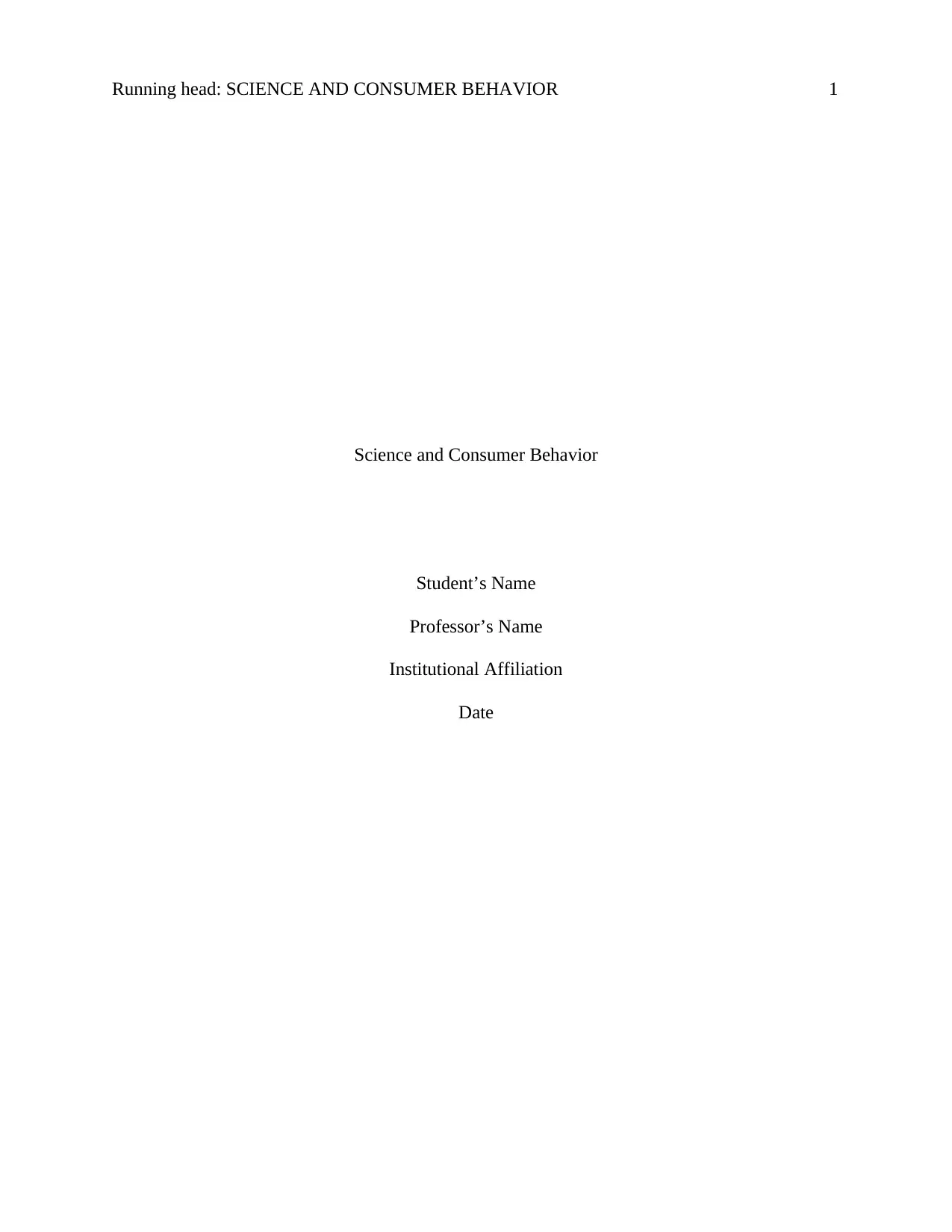
Running head: SCIENCE AND CONSUMER BEHAVIOR 1
Science and Consumer Behavior
Student’s Name
Professor’s Name
Institutional Affiliation
Date
Science and Consumer Behavior
Student’s Name
Professor’s Name
Institutional Affiliation
Date
Paraphrase This Document
Need a fresh take? Get an instant paraphrase of this document with our AI Paraphraser
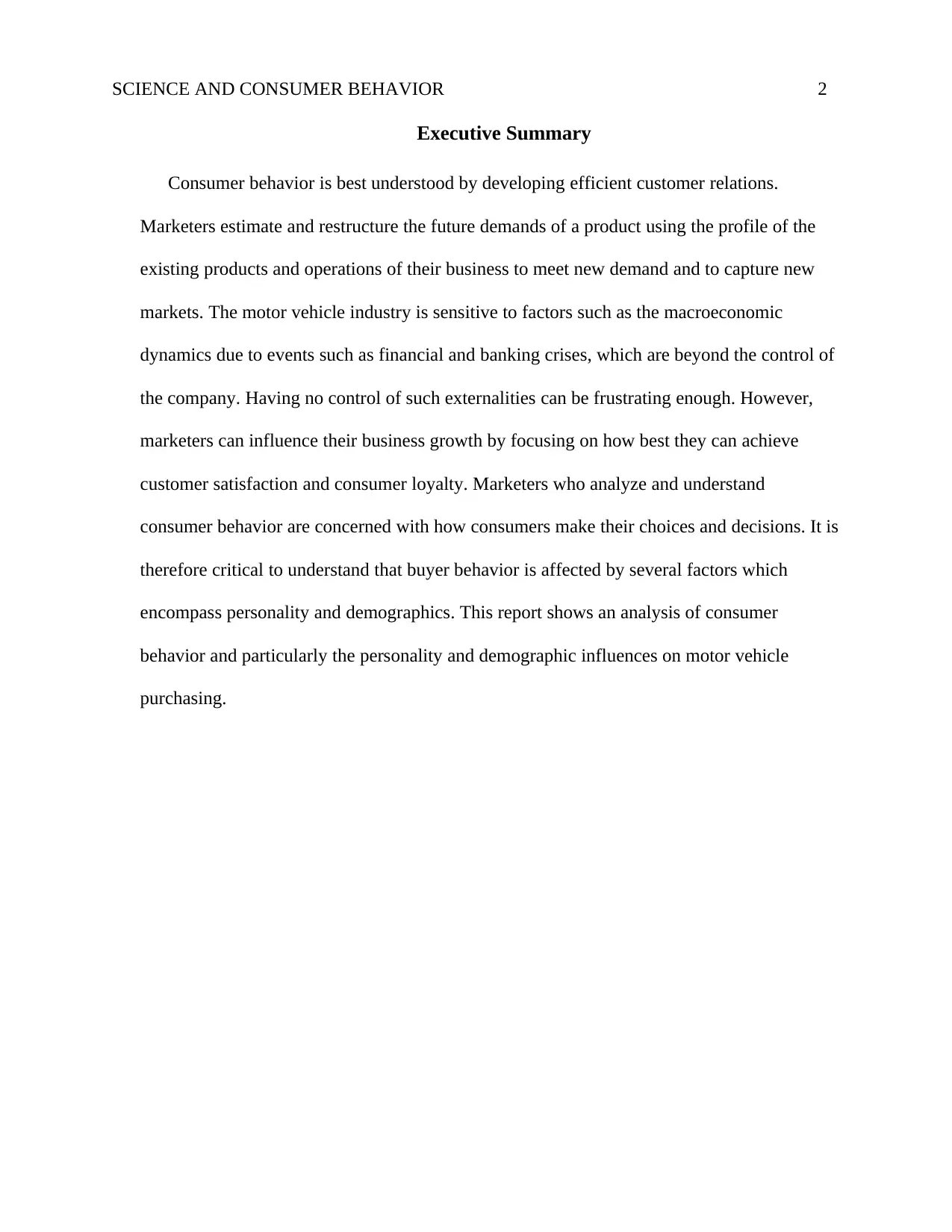
SCIENCE AND CONSUMER BEHAVIOR 2
Executive Summary
Consumer behavior is best understood by developing efficient customer relations.
Marketers estimate and restructure the future demands of a product using the profile of the
existing products and operations of their business to meet new demand and to capture new
markets. The motor vehicle industry is sensitive to factors such as the macroeconomic
dynamics due to events such as financial and banking crises, which are beyond the control of
the company. Having no control of such externalities can be frustrating enough. However,
marketers can influence their business growth by focusing on how best they can achieve
customer satisfaction and consumer loyalty. Marketers who analyze and understand
consumer behavior are concerned with how consumers make their choices and decisions. It is
therefore critical to understand that buyer behavior is affected by several factors which
encompass personality and demographics. This report shows an analysis of consumer
behavior and particularly the personality and demographic influences on motor vehicle
purchasing.
Executive Summary
Consumer behavior is best understood by developing efficient customer relations.
Marketers estimate and restructure the future demands of a product using the profile of the
existing products and operations of their business to meet new demand and to capture new
markets. The motor vehicle industry is sensitive to factors such as the macroeconomic
dynamics due to events such as financial and banking crises, which are beyond the control of
the company. Having no control of such externalities can be frustrating enough. However,
marketers can influence their business growth by focusing on how best they can achieve
customer satisfaction and consumer loyalty. Marketers who analyze and understand
consumer behavior are concerned with how consumers make their choices and decisions. It is
therefore critical to understand that buyer behavior is affected by several factors which
encompass personality and demographics. This report shows an analysis of consumer
behavior and particularly the personality and demographic influences on motor vehicle
purchasing.
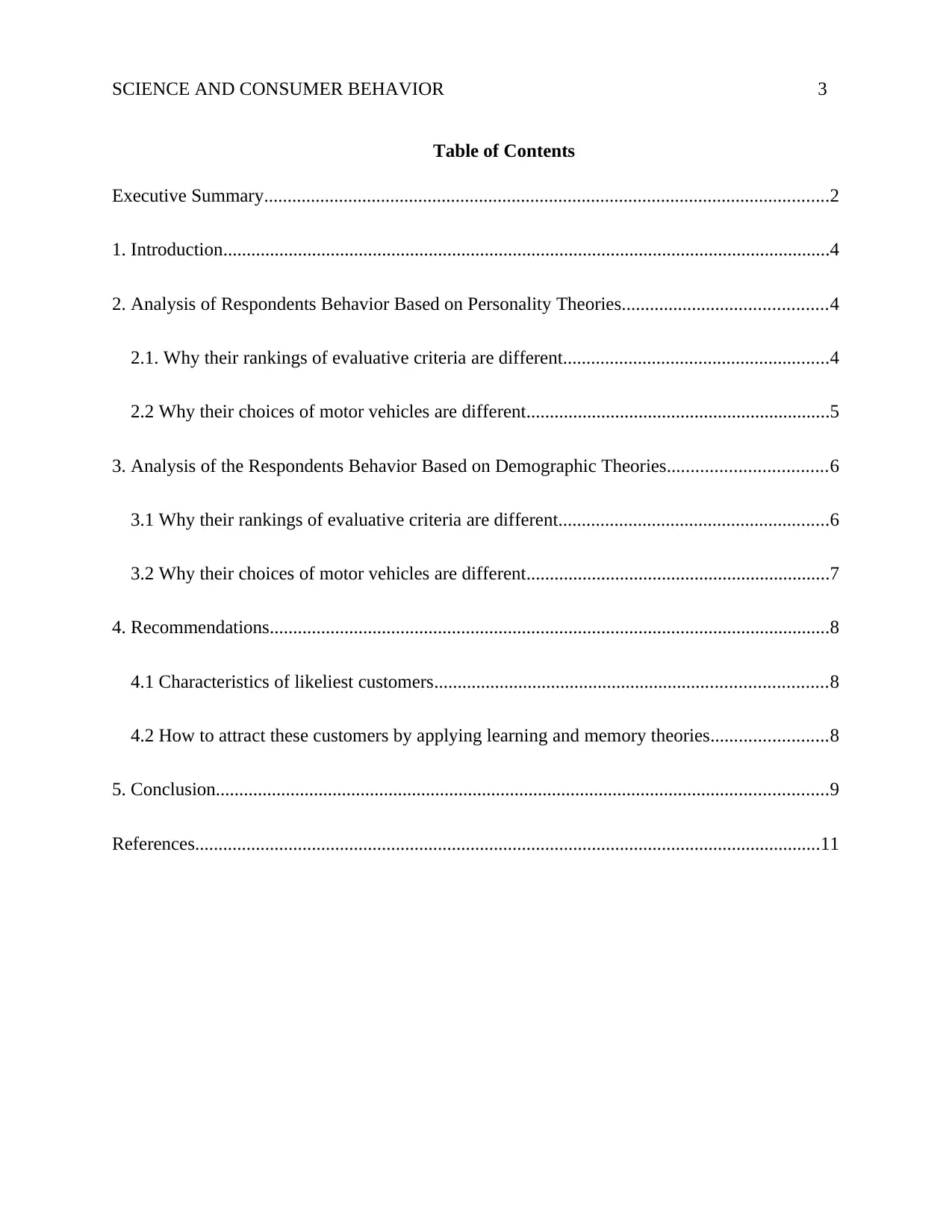
SCIENCE AND CONSUMER BEHAVIOR 3
Table of Contents
Executive Summary.........................................................................................................................2
1. Introduction..................................................................................................................................4
2. Analysis of Respondents Behavior Based on Personality Theories............................................4
2.1. Why their rankings of evaluative criteria are different.........................................................4
2.2 Why their choices of motor vehicles are different.................................................................5
3. Analysis of the Respondents Behavior Based on Demographic Theories..................................6
3.1 Why their rankings of evaluative criteria are different..........................................................6
3.2 Why their choices of motor vehicles are different.................................................................7
4. Recommendations........................................................................................................................8
4.1 Characteristics of likeliest customers....................................................................................8
4.2 How to attract these customers by applying learning and memory theories.........................8
5. Conclusion...................................................................................................................................9
References......................................................................................................................................11
Table of Contents
Executive Summary.........................................................................................................................2
1. Introduction..................................................................................................................................4
2. Analysis of Respondents Behavior Based on Personality Theories............................................4
2.1. Why their rankings of evaluative criteria are different.........................................................4
2.2 Why their choices of motor vehicles are different.................................................................5
3. Analysis of the Respondents Behavior Based on Demographic Theories..................................6
3.1 Why their rankings of evaluative criteria are different..........................................................6
3.2 Why their choices of motor vehicles are different.................................................................7
4. Recommendations........................................................................................................................8
4.1 Characteristics of likeliest customers....................................................................................8
4.2 How to attract these customers by applying learning and memory theories.........................8
5. Conclusion...................................................................................................................................9
References......................................................................................................................................11
⊘ This is a preview!⊘
Do you want full access?
Subscribe today to unlock all pages.

Trusted by 1+ million students worldwide
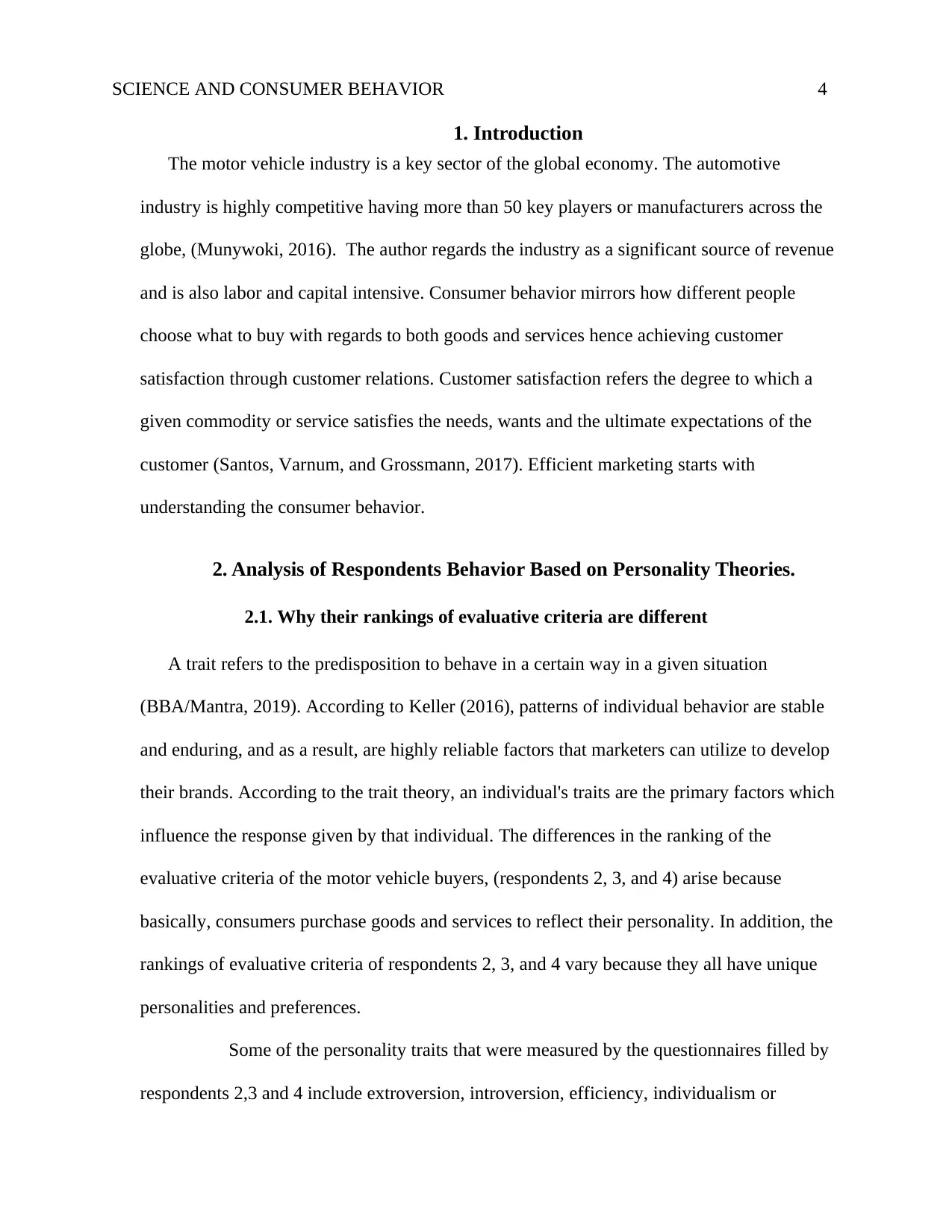
SCIENCE AND CONSUMER BEHAVIOR 4
1. Introduction
The motor vehicle industry is a key sector of the global economy. The automotive
industry is highly competitive having more than 50 key players or manufacturers across the
globe, (Munywoki, 2016). The author regards the industry as a significant source of revenue
and is also labor and capital intensive. Consumer behavior mirrors how different people
choose what to buy with regards to both goods and services hence achieving customer
satisfaction through customer relations. Customer satisfaction refers the degree to which a
given commodity or service satisfies the needs, wants and the ultimate expectations of the
customer (Santos, Varnum, and Grossmann, 2017). Efficient marketing starts with
understanding the consumer behavior.
2. Analysis of Respondents Behavior Based on Personality Theories.
2.1. Why their rankings of evaluative criteria are different
A trait refers to the predisposition to behave in a certain way in a given situation
(BBA/Mantra, 2019). According to Keller (2016), patterns of individual behavior are stable
and enduring, and as a result, are highly reliable factors that marketers can utilize to develop
their brands. According to the trait theory, an individual's traits are the primary factors which
influence the response given by that individual. The differences in the ranking of the
evaluative criteria of the motor vehicle buyers, (respondents 2, 3, and 4) arise because
basically, consumers purchase goods and services to reflect their personality. In addition, the
rankings of evaluative criteria of respondents 2, 3, and 4 vary because they all have unique
personalities and preferences.
Some of the personality traits that were measured by the questionnaires filled by
respondents 2,3 and 4 include extroversion, introversion, efficiency, individualism or
1. Introduction
The motor vehicle industry is a key sector of the global economy. The automotive
industry is highly competitive having more than 50 key players or manufacturers across the
globe, (Munywoki, 2016). The author regards the industry as a significant source of revenue
and is also labor and capital intensive. Consumer behavior mirrors how different people
choose what to buy with regards to both goods and services hence achieving customer
satisfaction through customer relations. Customer satisfaction refers the degree to which a
given commodity or service satisfies the needs, wants and the ultimate expectations of the
customer (Santos, Varnum, and Grossmann, 2017). Efficient marketing starts with
understanding the consumer behavior.
2. Analysis of Respondents Behavior Based on Personality Theories.
2.1. Why their rankings of evaluative criteria are different
A trait refers to the predisposition to behave in a certain way in a given situation
(BBA/Mantra, 2019). According to Keller (2016), patterns of individual behavior are stable
and enduring, and as a result, are highly reliable factors that marketers can utilize to develop
their brands. According to the trait theory, an individual's traits are the primary factors which
influence the response given by that individual. The differences in the ranking of the
evaluative criteria of the motor vehicle buyers, (respondents 2, 3, and 4) arise because
basically, consumers purchase goods and services to reflect their personality. In addition, the
rankings of evaluative criteria of respondents 2, 3, and 4 vary because they all have unique
personalities and preferences.
Some of the personality traits that were measured by the questionnaires filled by
respondents 2,3 and 4 include extroversion, introversion, efficiency, individualism or
Paraphrase This Document
Need a fresh take? Get an instant paraphrase of this document with our AI Paraphraser
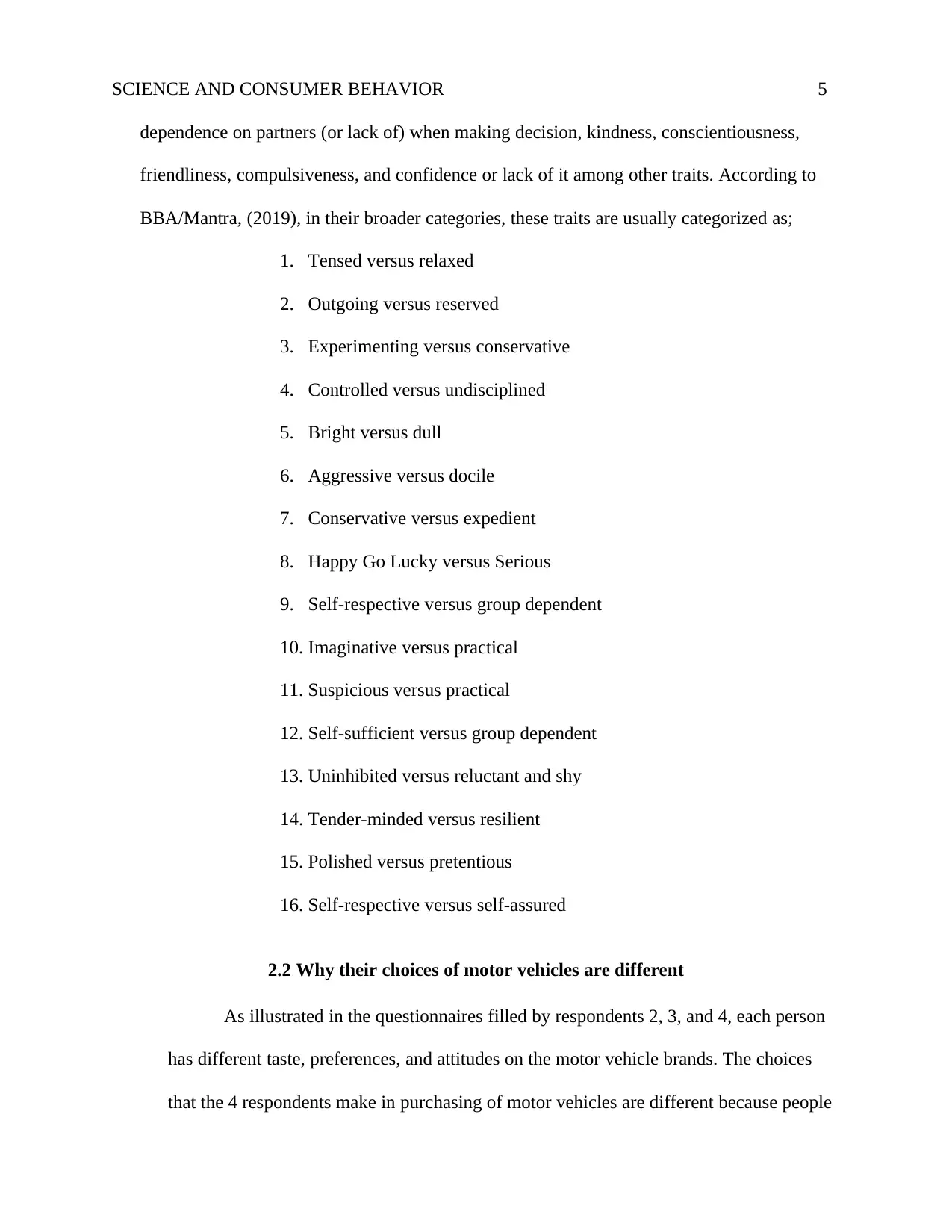
SCIENCE AND CONSUMER BEHAVIOR 5
dependence on partners (or lack of) when making decision, kindness, conscientiousness,
friendliness, compulsiveness, and confidence or lack of it among other traits. According to
BBA/Mantra, (2019), in their broader categories, these traits are usually categorized as;
1. Tensed versus relaxed
2. Outgoing versus reserved
3. Experimenting versus conservative
4. Controlled versus undisciplined
5. Bright versus dull
6. Aggressive versus docile
7. Conservative versus expedient
8. Happy Go Lucky versus Serious
9. Self-respective versus group dependent
10. Imaginative versus practical
11. Suspicious versus practical
12. Self-sufficient versus group dependent
13. Uninhibited versus reluctant and shy
14. Tender-minded versus resilient
15. Polished versus pretentious
16. Self-respective versus self-assured
2.2 Why their choices of motor vehicles are different
As illustrated in the questionnaires filled by respondents 2, 3, and 4, each person
has different taste, preferences, and attitudes on the motor vehicle brands. The choices
that the 4 respondents make in purchasing of motor vehicles are different because people
dependence on partners (or lack of) when making decision, kindness, conscientiousness,
friendliness, compulsiveness, and confidence or lack of it among other traits. According to
BBA/Mantra, (2019), in their broader categories, these traits are usually categorized as;
1. Tensed versus relaxed
2. Outgoing versus reserved
3. Experimenting versus conservative
4. Controlled versus undisciplined
5. Bright versus dull
6. Aggressive versus docile
7. Conservative versus expedient
8. Happy Go Lucky versus Serious
9. Self-respective versus group dependent
10. Imaginative versus practical
11. Suspicious versus practical
12. Self-sufficient versus group dependent
13. Uninhibited versus reluctant and shy
14. Tender-minded versus resilient
15. Polished versus pretentious
16. Self-respective versus self-assured
2.2 Why their choices of motor vehicles are different
As illustrated in the questionnaires filled by respondents 2, 3, and 4, each person
has different taste, preferences, and attitudes on the motor vehicle brands. The choices
that the 4 respondents make in purchasing of motor vehicles are different because people
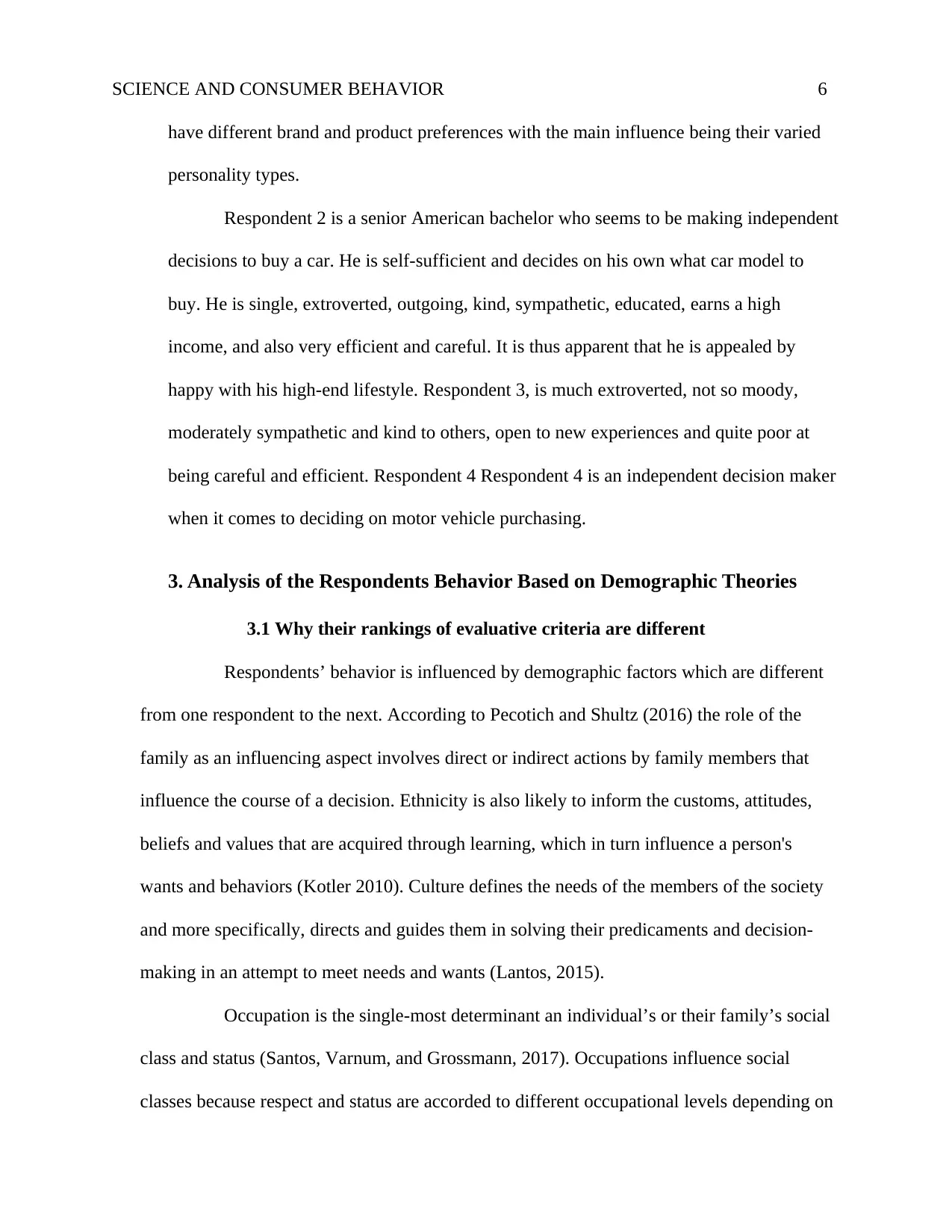
SCIENCE AND CONSUMER BEHAVIOR 6
have different brand and product preferences with the main influence being their varied
personality types.
Respondent 2 is a senior American bachelor who seems to be making independent
decisions to buy a car. He is self-sufficient and decides on his own what car model to
buy. He is single, extroverted, outgoing, kind, sympathetic, educated, earns a high
income, and also very efficient and careful. It is thus apparent that he is appealed by
happy with his high-end lifestyle. Respondent 3, is much extroverted, not so moody,
moderately sympathetic and kind to others, open to new experiences and quite poor at
being careful and efficient. Respondent 4 Respondent 4 is an independent decision maker
when it comes to deciding on motor vehicle purchasing.
3. Analysis of the Respondents Behavior Based on Demographic Theories
3.1 Why their rankings of evaluative criteria are different
Respondents’ behavior is influenced by demographic factors which are different
from one respondent to the next. According to Pecotich and Shultz (2016) the role of the
family as an influencing aspect involves direct or indirect actions by family members that
influence the course of a decision. Ethnicity is also likely to inform the customs, attitudes,
beliefs and values that are acquired through learning, which in turn influence a person's
wants and behaviors (Kotler 2010). Culture defines the needs of the members of the society
and more specifically, directs and guides them in solving their predicaments and decision-
making in an attempt to meet needs and wants (Lantos, 2015).
Occupation is the single-most determinant an individual’s or their family’s social
class and status (Santos, Varnum, and Grossmann, 2017). Occupations influence social
classes because respect and status are accorded to different occupational levels depending on
have different brand and product preferences with the main influence being their varied
personality types.
Respondent 2 is a senior American bachelor who seems to be making independent
decisions to buy a car. He is self-sufficient and decides on his own what car model to
buy. He is single, extroverted, outgoing, kind, sympathetic, educated, earns a high
income, and also very efficient and careful. It is thus apparent that he is appealed by
happy with his high-end lifestyle. Respondent 3, is much extroverted, not so moody,
moderately sympathetic and kind to others, open to new experiences and quite poor at
being careful and efficient. Respondent 4 Respondent 4 is an independent decision maker
when it comes to deciding on motor vehicle purchasing.
3. Analysis of the Respondents Behavior Based on Demographic Theories
3.1 Why their rankings of evaluative criteria are different
Respondents’ behavior is influenced by demographic factors which are different
from one respondent to the next. According to Pecotich and Shultz (2016) the role of the
family as an influencing aspect involves direct or indirect actions by family members that
influence the course of a decision. Ethnicity is also likely to inform the customs, attitudes,
beliefs and values that are acquired through learning, which in turn influence a person's
wants and behaviors (Kotler 2010). Culture defines the needs of the members of the society
and more specifically, directs and guides them in solving their predicaments and decision-
making in an attempt to meet needs and wants (Lantos, 2015).
Occupation is the single-most determinant an individual’s or their family’s social
class and status (Santos, Varnum, and Grossmann, 2017). Occupations influence social
classes because respect and status are accorded to different occupational levels depending on
⊘ This is a preview!⊘
Do you want full access?
Subscribe today to unlock all pages.

Trusted by 1+ million students worldwide
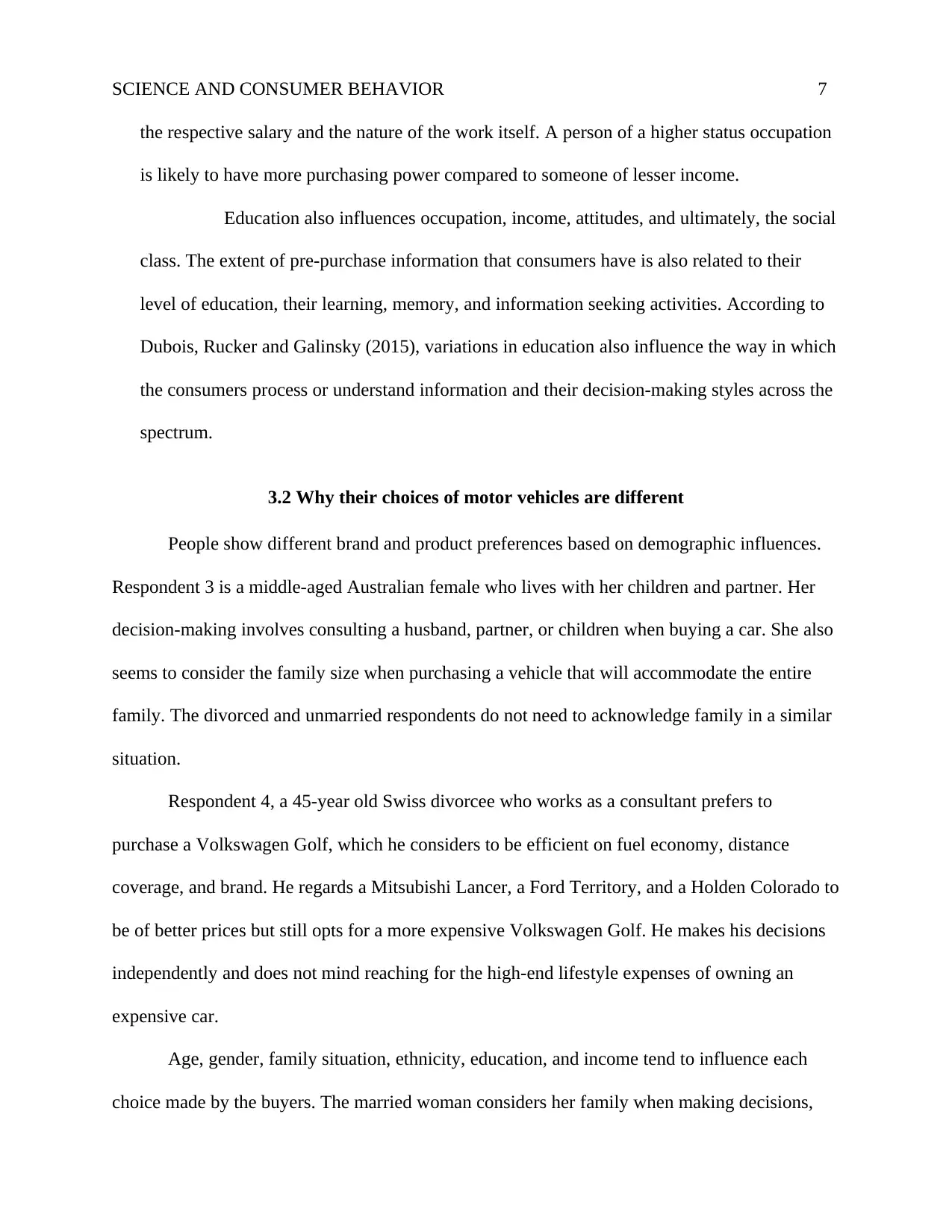
SCIENCE AND CONSUMER BEHAVIOR 7
the respective salary and the nature of the work itself. A person of a higher status occupation
is likely to have more purchasing power compared to someone of lesser income.
Education also influences occupation, income, attitudes, and ultimately, the social
class. The extent of pre-purchase information that consumers have is also related to their
level of education, their learning, memory, and information seeking activities. According to
Dubois, Rucker and Galinsky (2015), variations in education also influence the way in which
the consumers process or understand information and their decision-making styles across the
spectrum.
3.2 Why their choices of motor vehicles are different
People show different brand and product preferences based on demographic influences.
Respondent 3 is a middle-aged Australian female who lives with her children and partner. Her
decision-making involves consulting a husband, partner, or children when buying a car. She also
seems to consider the family size when purchasing a vehicle that will accommodate the entire
family. The divorced and unmarried respondents do not need to acknowledge family in a similar
situation.
Respondent 4, a 45-year old Swiss divorcee who works as a consultant prefers to
purchase a Volkswagen Golf, which he considers to be efficient on fuel economy, distance
coverage, and brand. He regards a Mitsubishi Lancer, a Ford Territory, and a Holden Colorado to
be of better prices but still opts for a more expensive Volkswagen Golf. He makes his decisions
independently and does not mind reaching for the high-end lifestyle expenses of owning an
expensive car.
Age, gender, family situation, ethnicity, education, and income tend to influence each
choice made by the buyers. The married woman considers her family when making decisions,
the respective salary and the nature of the work itself. A person of a higher status occupation
is likely to have more purchasing power compared to someone of lesser income.
Education also influences occupation, income, attitudes, and ultimately, the social
class. The extent of pre-purchase information that consumers have is also related to their
level of education, their learning, memory, and information seeking activities. According to
Dubois, Rucker and Galinsky (2015), variations in education also influence the way in which
the consumers process or understand information and their decision-making styles across the
spectrum.
3.2 Why their choices of motor vehicles are different
People show different brand and product preferences based on demographic influences.
Respondent 3 is a middle-aged Australian female who lives with her children and partner. Her
decision-making involves consulting a husband, partner, or children when buying a car. She also
seems to consider the family size when purchasing a vehicle that will accommodate the entire
family. The divorced and unmarried respondents do not need to acknowledge family in a similar
situation.
Respondent 4, a 45-year old Swiss divorcee who works as a consultant prefers to
purchase a Volkswagen Golf, which he considers to be efficient on fuel economy, distance
coverage, and brand. He regards a Mitsubishi Lancer, a Ford Territory, and a Holden Colorado to
be of better prices but still opts for a more expensive Volkswagen Golf. He makes his decisions
independently and does not mind reaching for the high-end lifestyle expenses of owning an
expensive car.
Age, gender, family situation, ethnicity, education, and income tend to influence each
choice made by the buyers. The married woman considers her family when making decisions,
Paraphrase This Document
Need a fresh take? Get an instant paraphrase of this document with our AI Paraphraser
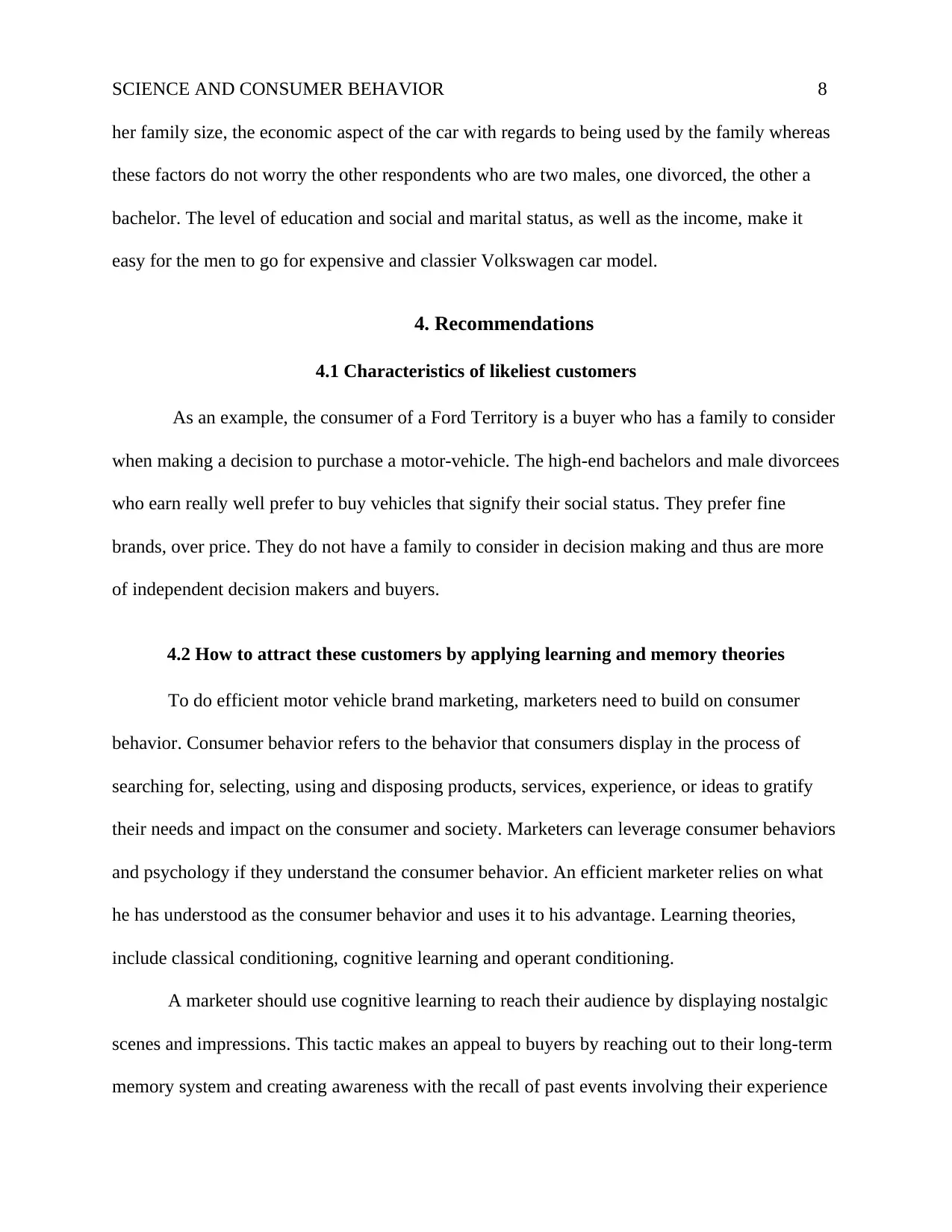
SCIENCE AND CONSUMER BEHAVIOR 8
her family size, the economic aspect of the car with regards to being used by the family whereas
these factors do not worry the other respondents who are two males, one divorced, the other a
bachelor. The level of education and social and marital status, as well as the income, make it
easy for the men to go for expensive and classier Volkswagen car model.
4. Recommendations
4.1 Characteristics of likeliest customers
As an example, the consumer of a Ford Territory is a buyer who has a family to consider
when making a decision to purchase a motor-vehicle. The high-end bachelors and male divorcees
who earn really well prefer to buy vehicles that signify their social status. They prefer fine
brands, over price. They do not have a family to consider in decision making and thus are more
of independent decision makers and buyers.
4.2 How to attract these customers by applying learning and memory theories
To do efficient motor vehicle brand marketing, marketers need to build on consumer
behavior. Consumer behavior refers to the behavior that consumers display in the process of
searching for, selecting, using and disposing products, services, experience, or ideas to gratify
their needs and impact on the consumer and society. Marketers can leverage consumer behaviors
and psychology if they understand the consumer behavior. An efficient marketer relies on what
he has understood as the consumer behavior and uses it to his advantage. Learning theories,
include classical conditioning, cognitive learning and operant conditioning.
A marketer should use cognitive learning to reach their audience by displaying nostalgic
scenes and impressions. This tactic makes an appeal to buyers by reaching out to their long-term
memory system and creating awareness with the recall of past events involving their experience
her family size, the economic aspect of the car with regards to being used by the family whereas
these factors do not worry the other respondents who are two males, one divorced, the other a
bachelor. The level of education and social and marital status, as well as the income, make it
easy for the men to go for expensive and classier Volkswagen car model.
4. Recommendations
4.1 Characteristics of likeliest customers
As an example, the consumer of a Ford Territory is a buyer who has a family to consider
when making a decision to purchase a motor-vehicle. The high-end bachelors and male divorcees
who earn really well prefer to buy vehicles that signify their social status. They prefer fine
brands, over price. They do not have a family to consider in decision making and thus are more
of independent decision makers and buyers.
4.2 How to attract these customers by applying learning and memory theories
To do efficient motor vehicle brand marketing, marketers need to build on consumer
behavior. Consumer behavior refers to the behavior that consumers display in the process of
searching for, selecting, using and disposing products, services, experience, or ideas to gratify
their needs and impact on the consumer and society. Marketers can leverage consumer behaviors
and psychology if they understand the consumer behavior. An efficient marketer relies on what
he has understood as the consumer behavior and uses it to his advantage. Learning theories,
include classical conditioning, cognitive learning and operant conditioning.
A marketer should use cognitive learning to reach their audience by displaying nostalgic
scenes and impressions. This tactic makes an appeal to buyers by reaching out to their long-term
memory system and creating awareness with the recall of past events involving their experience
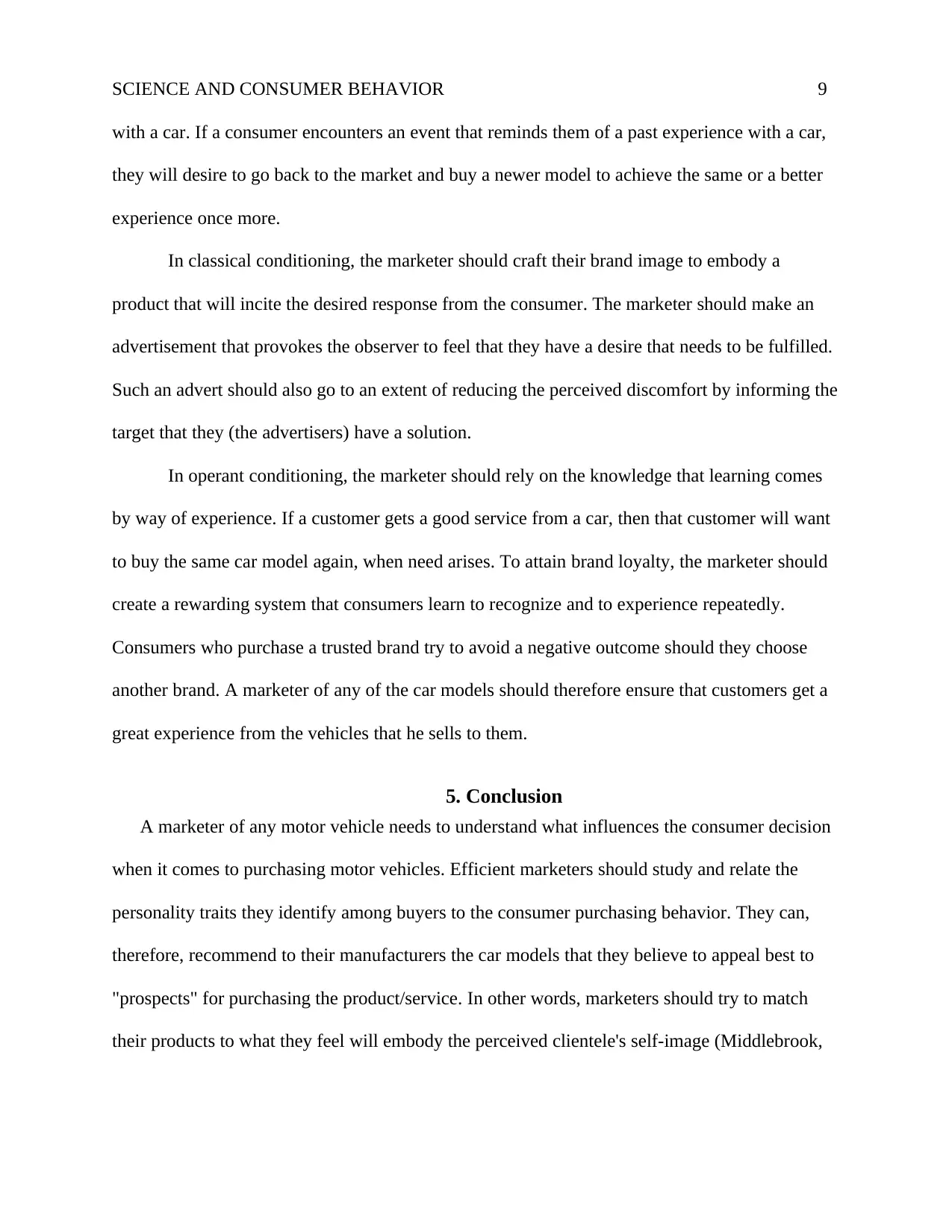
SCIENCE AND CONSUMER BEHAVIOR 9
with a car. If a consumer encounters an event that reminds them of a past experience with a car,
they will desire to go back to the market and buy a newer model to achieve the same or a better
experience once more.
In classical conditioning, the marketer should craft their brand image to embody a
product that will incite the desired response from the consumer. The marketer should make an
advertisement that provokes the observer to feel that they have a desire that needs to be fulfilled.
Such an advert should also go to an extent of reducing the perceived discomfort by informing the
target that they (the advertisers) have a solution.
In operant conditioning, the marketer should rely on the knowledge that learning comes
by way of experience. If a customer gets a good service from a car, then that customer will want
to buy the same car model again, when need arises. To attain brand loyalty, the marketer should
create a rewarding system that consumers learn to recognize and to experience repeatedly.
Consumers who purchase a trusted brand try to avoid a negative outcome should they choose
another brand. A marketer of any of the car models should therefore ensure that customers get a
great experience from the vehicles that he sells to them.
5. Conclusion
A marketer of any motor vehicle needs to understand what influences the consumer decision
when it comes to purchasing motor vehicles. Efficient marketers should study and relate the
personality traits they identify among buyers to the consumer purchasing behavior. They can,
therefore, recommend to their manufacturers the car models that they believe to appeal best to
"prospects" for purchasing the product/service. In other words, marketers should try to match
their products to what they feel will embody the perceived clientele's self-image (Middlebrook,
with a car. If a consumer encounters an event that reminds them of a past experience with a car,
they will desire to go back to the market and buy a newer model to achieve the same or a better
experience once more.
In classical conditioning, the marketer should craft their brand image to embody a
product that will incite the desired response from the consumer. The marketer should make an
advertisement that provokes the observer to feel that they have a desire that needs to be fulfilled.
Such an advert should also go to an extent of reducing the perceived discomfort by informing the
target that they (the advertisers) have a solution.
In operant conditioning, the marketer should rely on the knowledge that learning comes
by way of experience. If a customer gets a good service from a car, then that customer will want
to buy the same car model again, when need arises. To attain brand loyalty, the marketer should
create a rewarding system that consumers learn to recognize and to experience repeatedly.
Consumers who purchase a trusted brand try to avoid a negative outcome should they choose
another brand. A marketer of any of the car models should therefore ensure that customers get a
great experience from the vehicles that he sells to them.
5. Conclusion
A marketer of any motor vehicle needs to understand what influences the consumer decision
when it comes to purchasing motor vehicles. Efficient marketers should study and relate the
personality traits they identify among buyers to the consumer purchasing behavior. They can,
therefore, recommend to their manufacturers the car models that they believe to appeal best to
"prospects" for purchasing the product/service. In other words, marketers should try to match
their products to what they feel will embody the perceived clientele's self-image (Middlebrook,
⊘ This is a preview!⊘
Do you want full access?
Subscribe today to unlock all pages.

Trusted by 1+ million students worldwide
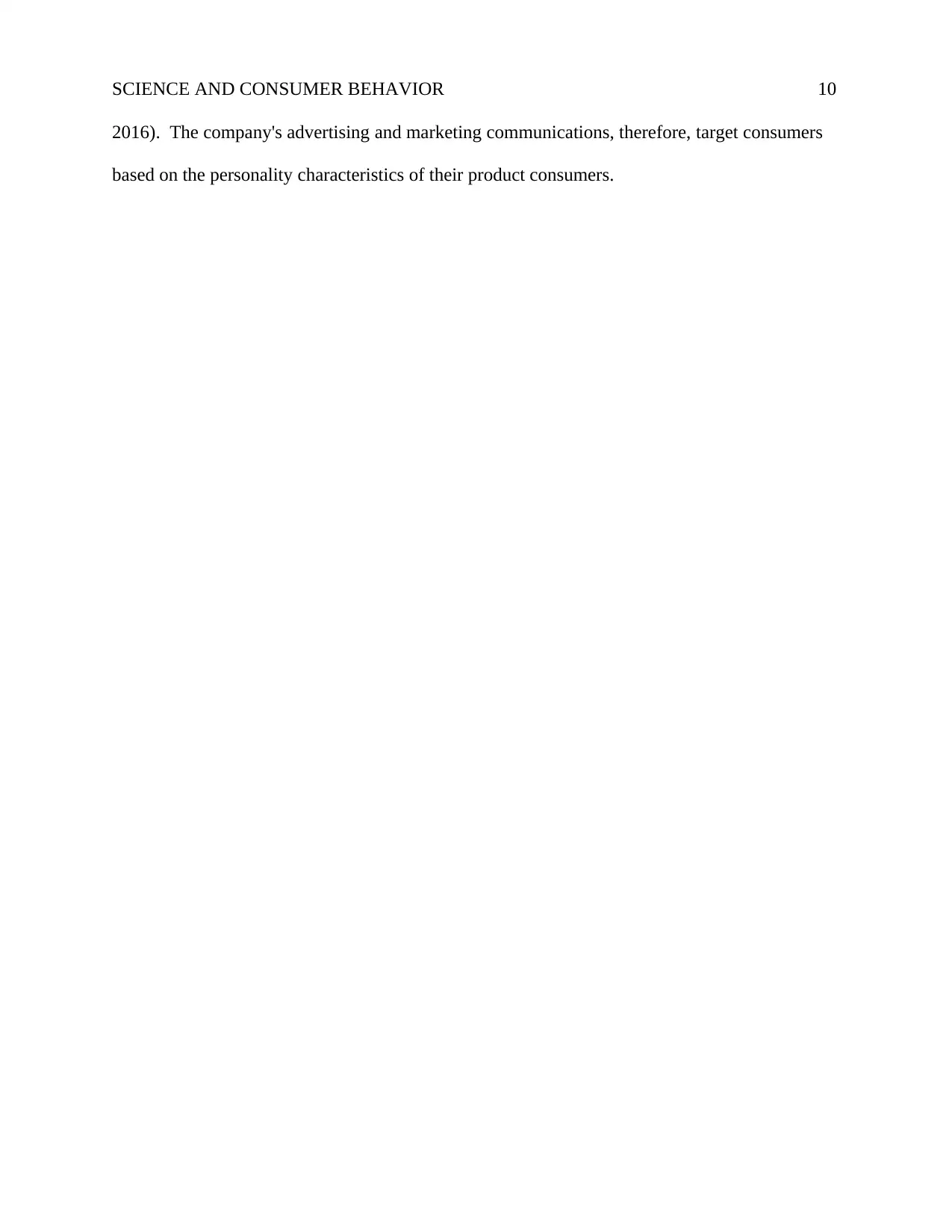
SCIENCE AND CONSUMER BEHAVIOR 10
2016). The company's advertising and marketing communications, therefore, target consumers
based on the personality characteristics of their product consumers.
2016). The company's advertising and marketing communications, therefore, target consumers
based on the personality characteristics of their product consumers.
Paraphrase This Document
Need a fresh take? Get an instant paraphrase of this document with our AI Paraphraser
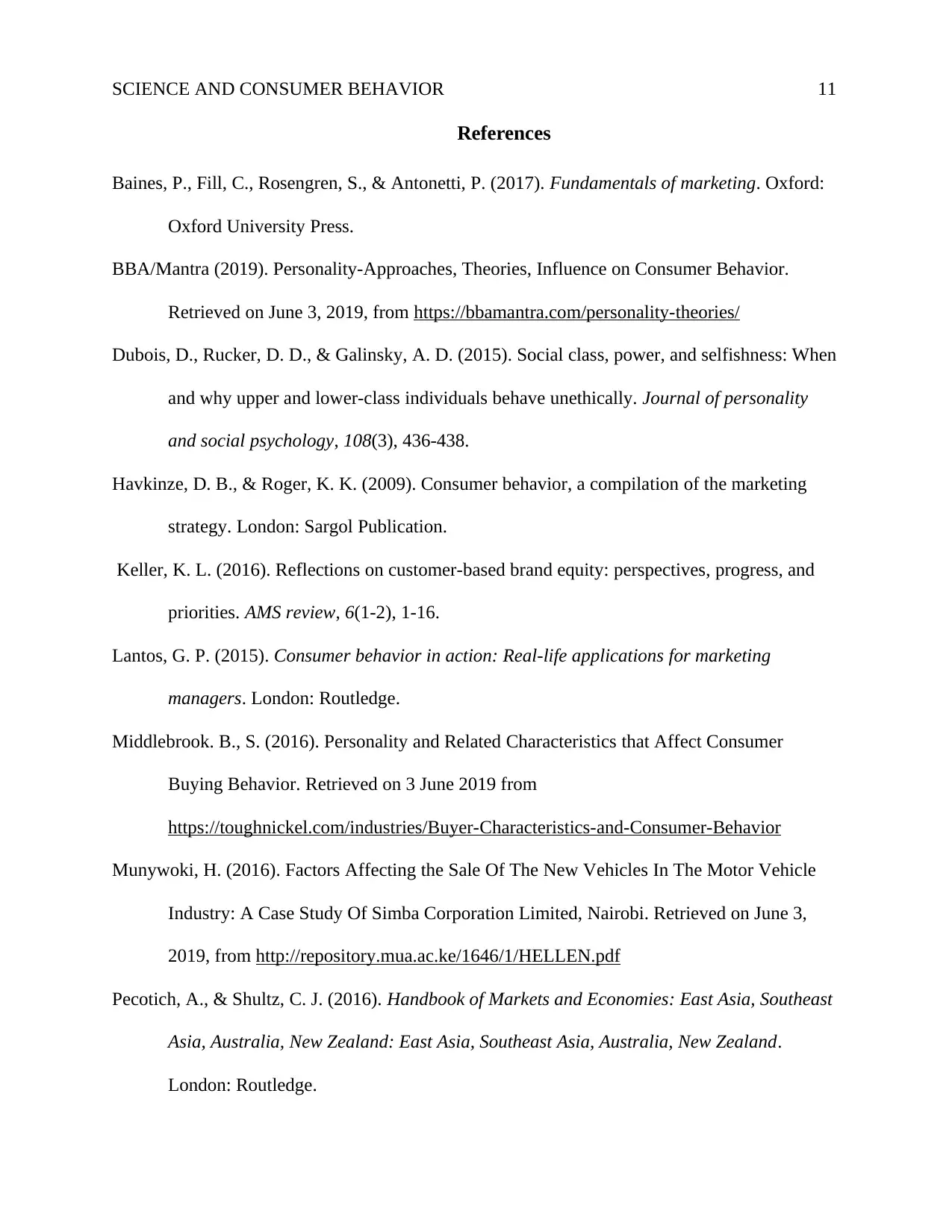
SCIENCE AND CONSUMER BEHAVIOR 11
References
Baines, P., Fill, C., Rosengren, S., & Antonetti, P. (2017). Fundamentals of marketing. Oxford:
Oxford University Press.
BBA/Mantra (2019). Personality-Approaches, Theories, Influence on Consumer Behavior.
Retrieved on June 3, 2019, from https://bbamantra.com/personality-theories/
Dubois, D., Rucker, D. D., & Galinsky, A. D. (2015). Social class, power, and selfishness: When
and why upper and lower-class individuals behave unethically. Journal of personality
and social psychology, 108(3), 436-438.
Havkinze, D. B., & Roger, K. K. (2009). Consumer behavior, a compilation of the marketing
strategy. London: Sargol Publication.
Keller, K. L. (2016). Reflections on customer-based brand equity: perspectives, progress, and
priorities. AMS review, 6(1-2), 1-16.
Lantos, G. P. (2015). Consumer behavior in action: Real-life applications for marketing
managers. London: Routledge.
Middlebrook. B., S. (2016). Personality and Related Characteristics that Affect Consumer
Buying Behavior. Retrieved on 3 June 2019 from
https://toughnickel.com/industries/Buyer-Characteristics-and-Consumer-Behavior
Munywoki, H. (2016). Factors Affecting the Sale Of The New Vehicles In The Motor Vehicle
Industry: A Case Study Of Simba Corporation Limited, Nairobi. Retrieved on June 3,
2019, from http://repository.mua.ac.ke/1646/1/HELLEN.pdf
Pecotich, A., & Shultz, C. J. (2016). Handbook of Markets and Economies: East Asia, Southeast
Asia, Australia, New Zealand: East Asia, Southeast Asia, Australia, New Zealand.
London: Routledge.
References
Baines, P., Fill, C., Rosengren, S., & Antonetti, P. (2017). Fundamentals of marketing. Oxford:
Oxford University Press.
BBA/Mantra (2019). Personality-Approaches, Theories, Influence on Consumer Behavior.
Retrieved on June 3, 2019, from https://bbamantra.com/personality-theories/
Dubois, D., Rucker, D. D., & Galinsky, A. D. (2015). Social class, power, and selfishness: When
and why upper and lower-class individuals behave unethically. Journal of personality
and social psychology, 108(3), 436-438.
Havkinze, D. B., & Roger, K. K. (2009). Consumer behavior, a compilation of the marketing
strategy. London: Sargol Publication.
Keller, K. L. (2016). Reflections on customer-based brand equity: perspectives, progress, and
priorities. AMS review, 6(1-2), 1-16.
Lantos, G. P. (2015). Consumer behavior in action: Real-life applications for marketing
managers. London: Routledge.
Middlebrook. B., S. (2016). Personality and Related Characteristics that Affect Consumer
Buying Behavior. Retrieved on 3 June 2019 from
https://toughnickel.com/industries/Buyer-Characteristics-and-Consumer-Behavior
Munywoki, H. (2016). Factors Affecting the Sale Of The New Vehicles In The Motor Vehicle
Industry: A Case Study Of Simba Corporation Limited, Nairobi. Retrieved on June 3,
2019, from http://repository.mua.ac.ke/1646/1/HELLEN.pdf
Pecotich, A., & Shultz, C. J. (2016). Handbook of Markets and Economies: East Asia, Southeast
Asia, Australia, New Zealand: East Asia, Southeast Asia, Australia, New Zealand.
London: Routledge.
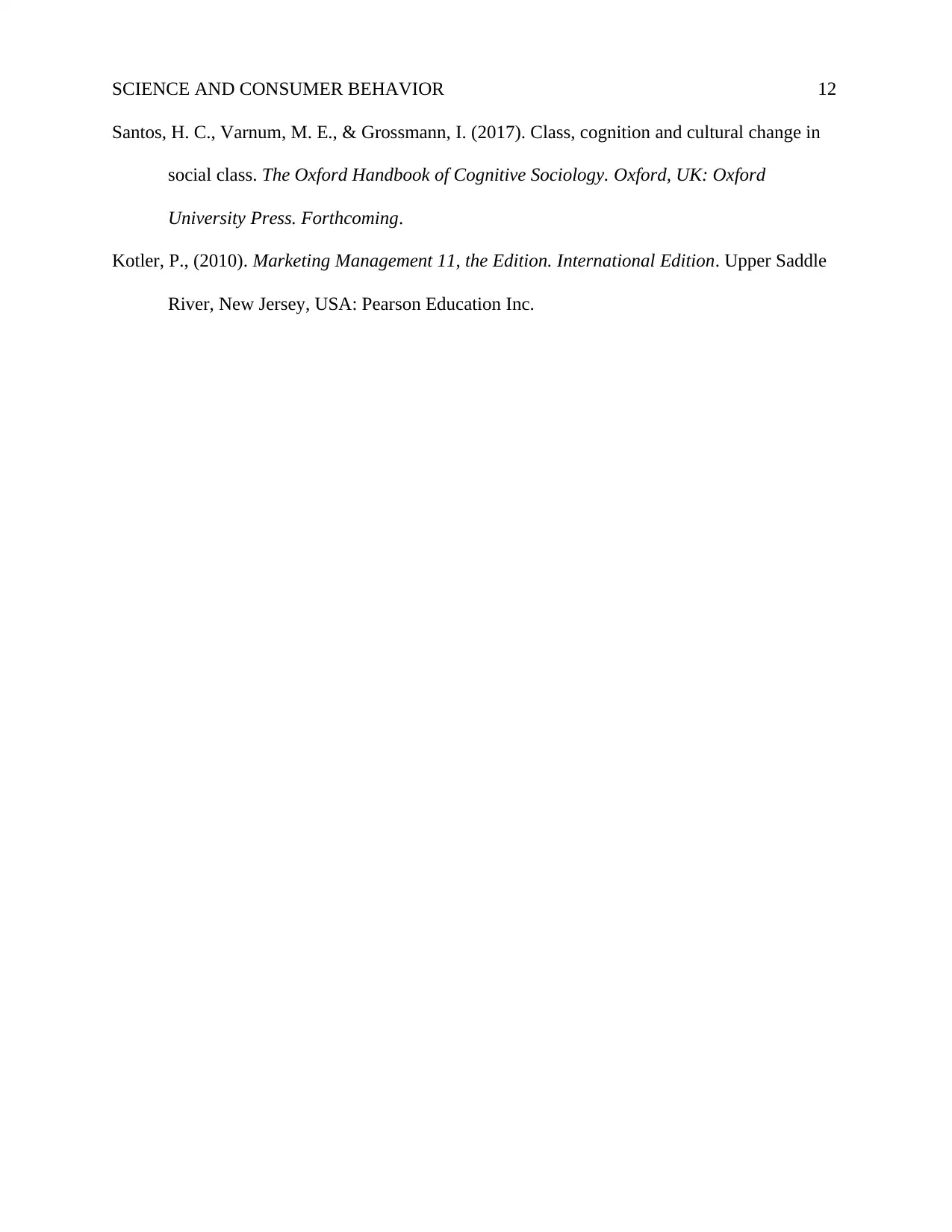
SCIENCE AND CONSUMER BEHAVIOR 12
Santos, H. C., Varnum, M. E., & Grossmann, I. (2017). Class, cognition and cultural change in
social class. The Oxford Handbook of Cognitive Sociology. Oxford, UK: Oxford
University Press. Forthcoming.
Kotler, P., (2010). Marketing Management 11, the Edition. International Edition. Upper Saddle
River, New Jersey, USA: Pearson Education Inc.
Santos, H. C., Varnum, M. E., & Grossmann, I. (2017). Class, cognition and cultural change in
social class. The Oxford Handbook of Cognitive Sociology. Oxford, UK: Oxford
University Press. Forthcoming.
Kotler, P., (2010). Marketing Management 11, the Edition. International Edition. Upper Saddle
River, New Jersey, USA: Pearson Education Inc.
⊘ This is a preview!⊘
Do you want full access?
Subscribe today to unlock all pages.

Trusted by 1+ million students worldwide
1 out of 12
Related Documents
Your All-in-One AI-Powered Toolkit for Academic Success.
+13062052269
info@desklib.com
Available 24*7 on WhatsApp / Email
![[object Object]](/_next/static/media/star-bottom.7253800d.svg)
Unlock your academic potential
Copyright © 2020–2026 A2Z Services. All Rights Reserved. Developed and managed by ZUCOL.




